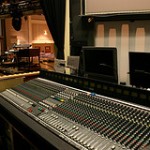Twitteresponse: Results or Approach?
Unfortunately Twitter doesn’t provide me enough characters to really respond to a good question I received earlier today in response to today’s quote so here’s my response. The question went something like this:
Deron Yevoli – @fohdave so do you focus more on approach or result?
Deron Yevoli – @fohdave quote seems to suggest that the result of the mix > a technique/strategy… would you agree? think I’m off-base?
In church audio, I think it’s complicated.
When someone’s behind a console mixing, I believe the result is ultimately the most important thing. That’s what people listening in the seats expect. They don’t care how you get there. When I’m mixing, I’m not thinking about what I’m doing; I just do it.
However, I also believe you can’t get the result without a great approach. So when it comes to training, approach is the more important focus.
The challenge often arrises on Sunday morning because while there are expectations for results, in church audio world we often also find ourselves training approaches as we go. Some people see this as a problem because sometimes we find ourselves in a position where our senior leadership wants things a certain way while volunteers get frustrated because they aren’t getting opportunities to learn and experiment with new approaches.
Something Andy Stanley talks about is how sometimes in leadership things we think are problems are actually tensions to manage. I believe this is a tension to manage. Sometimes we need to get in and make the result happen and sometimes it is better to stand back and let something not be the absolute best it can be if the person driving will learn and grow from the experience. The wisdom comes in managing these two tensions at any given time.
All that said, I believe right now that the larger church audio community I come in contact with is too focused on approaches and not enough on the result. We often care more about the equipment and how to use it than what it’s actually achieving, and I think we need to balance the two a lot more than we’ve been doing.
Great musicians in the world don’t think about what they’re playing. They pick up their instruments and play. I don’t think it should be any different for a mixer.

 Next Post
Next Post



thanks for the response!
first, sorry for the either/or… I meant the question more like ‘where do you lean’ not ‘what do you ignore’? 🙂
so, I think we mostly agree. Church audio is about the worship of the congregation and, as such, I tend to lean towards results rather than approach. If an engineer can sit down and create a mix using an approach very different than mine, but arrive at the ‘same’ spot (leading the congregation in worship, sounding like the original record, etc), then I’m not sure it REALLY matters… I think this is why I tend to lean more helping audio volunteers (those who are slightly farther along than knowing where the buttons are) learn to listen & train their ears, than giving them more techniques. But this tension can be a double-edged sword because if we don’t start from the same place, it can be hard to end in the same place even with good guidelines.
I think what got my question started was, at times, it seems like I’m not ‘equipping’ my audio vols with lots of techniques and different ways of mixing (1001 Ways to Mix at Our Church)… So I appreciated the quote because it seemed to agree with some of how I’m training.
But I still wonder if you *lean* one direction or another with your ministry…. do you stress similar approaches to mixing so that there are similar results, or are you a bit more open and free on the approach/technique, but more strict on the goal/result?
These days I’m probably going to lean more towards the results side at FOH. We’ve got a variety of guys who mix FOH, and they all have their own ways of doing things. I understand there’s a certain amount of pressure that comes with sitting in that seat, and I want those guys to be as comfortable as possible so they can focus on mixing and not doing certain things a certain way. The downside on this, though, is it would be really hard for someone else to takeover their mix. Now that we’ve added a 6pm service, I’m revisiting this a bit since the evening crew is different from the morning so someone will takeover someone else’s mix for the evening service.
At monitors, I might lean a little more towards approach, although it’s still about getting the results the musicians want. The monitor engineer pool is a little larger, and I think it is more important to standardize approaches/workflows there since a lot of different guys train with different guys. When you have three guys training someone new with three different ways of doing things, it can get challenging for the trainee and lengthen the process. I’m finding it’s better to start with one way of doing things and as guys get more experienced you can start opening their eyes to some other options.